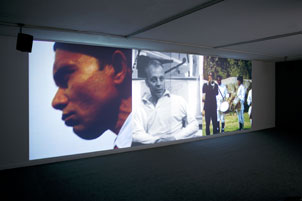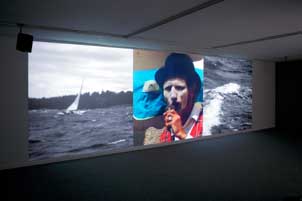| |
|||||||
| |
Mats Hjelm Trilogy: White Flight, Man to Man, Kap Atlantis February 1, 2003 – March 23, 2003 |
||||||
| |
|||||||
|
|
||||||
| |
|||||||
| History and memory,
collective and personal experiences against the backdrop of different
conceptions of manhood, power and violence are among the central themes
of Mats Hjelm's installations. In his trilogy "White Flight"
(1997), "Man to Man" (2000) and "Kap Atlantis"
(2002) the Swedish artist (born 1959) combines historical film material
shot by his journalist father in various political and battle scenes
around the world with his own shots, some of which were made in the
same locations and sometimes with the same protagonists.
For "White Flight" Mats Hjelm returned to Detroit, the city which in the post-war years was the flagship of American industry and home of a stronger black middle class. In the sixties, this city was also the site of the worst racial unrest in the history of the United States. Drawing from documentary shots of the black power movement in Detroit and the violent clashes between the military and the black population which Hjelm's father Lars filmed in 1968, White Flight illustrates how the past continues to have an effect in the present, how the legacy of a generation can be passed on to the next one – or possibly be lost. In an interview Hjelm conducted with a former leader of the Black Panther movement we learn: "We have lost two generations of blacks." At the same time White Flight is also Hjelm's artistic way of taking leave from his father who died in 1996. In loops of images installed next to each other the various film sequences merge to form a non-linear narrative – the formal analogy to a non-chronological structure of memory, its images and effects. In an interview Hjelm thus emphasized: "I'm searching for the kind of things I recognize. For things I have a feeling about, for something that influences me, not as a possible subject of debate but as an image. ... the foundation of a political position." "Man to Man", the second installation of the trilogy, is a formal and thematic continuation of White Flight. Once again, Mat Hjelms works with his father's documentary material, this time imagery taken from the war in Vietnam, and merges it with present-day shots. Here, even more than in White Flight, Hjelm detaches his gaze from the individual event and draws attention to the structures of a society that produce violence, that is violence itself, as Stockley Carmichael, one of the central figures of the black power movement, states in a passage of this piece. Hjelm's preoccupation with the ethical underpinnings of politics and society and the destructive legacy that one generation passes on to another assumes an almost existential dimension in "Kap Atlantis". The title was derived from Harry Martinsson's epos Aniara (1956), a pessimistic vision of the future. 8,000 refugees are in a space ship on an uncertain journey through space after Kap Atlantis, a fictive place in Martinsson's "science fiction", has become inhabitable. In Kap Atlantis, Hjelm uses largely newly shot film material, making references to both Christianity and Islam. Indirectly, this final part of his trilogy also refers to the catastrophe of September 11, 2001 in New York, drawing a line that leads back to the apocalyptic atmosphere triggered by the atom bomb. This atmosphere characterized the late fifties – the period in which Mat Hjelm was born and Aniara was written. As already in White Flight and Man to Man, the non-linear, rhythmic narrative structure of Kap Atlantis calls into question the chronology of events and our idea of historiography. Old and new material, filmic imagery and texts are superimposed and merged in Hjelm's trilogy, allowing a dense and "highly personal tale about absence and loss" (Lars O Ericsson) to emerge. |
|||||||
| |
|||||||
|
Catalogue Lecture Catalogue presentation |
|||||||
| |
|||||||
|

